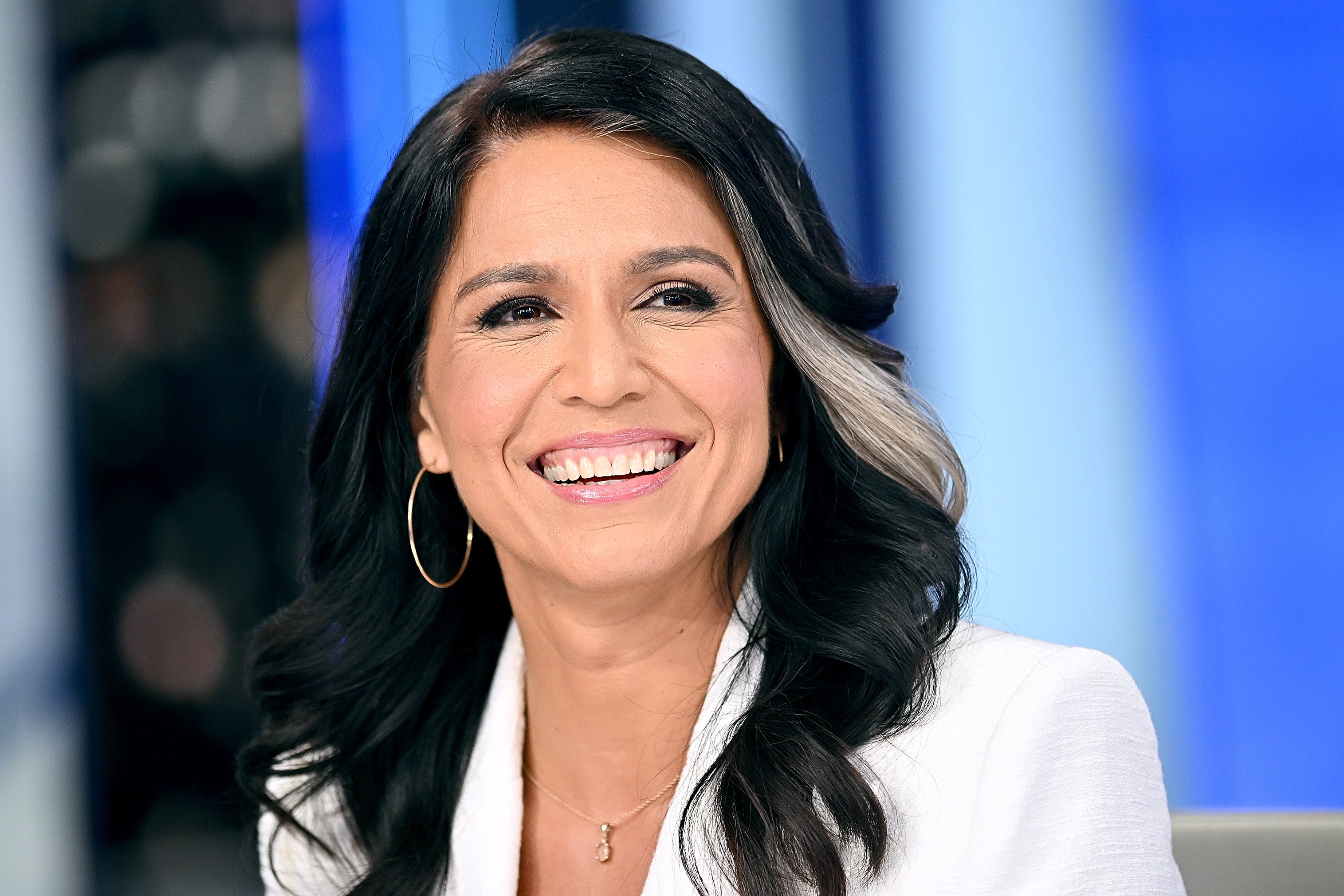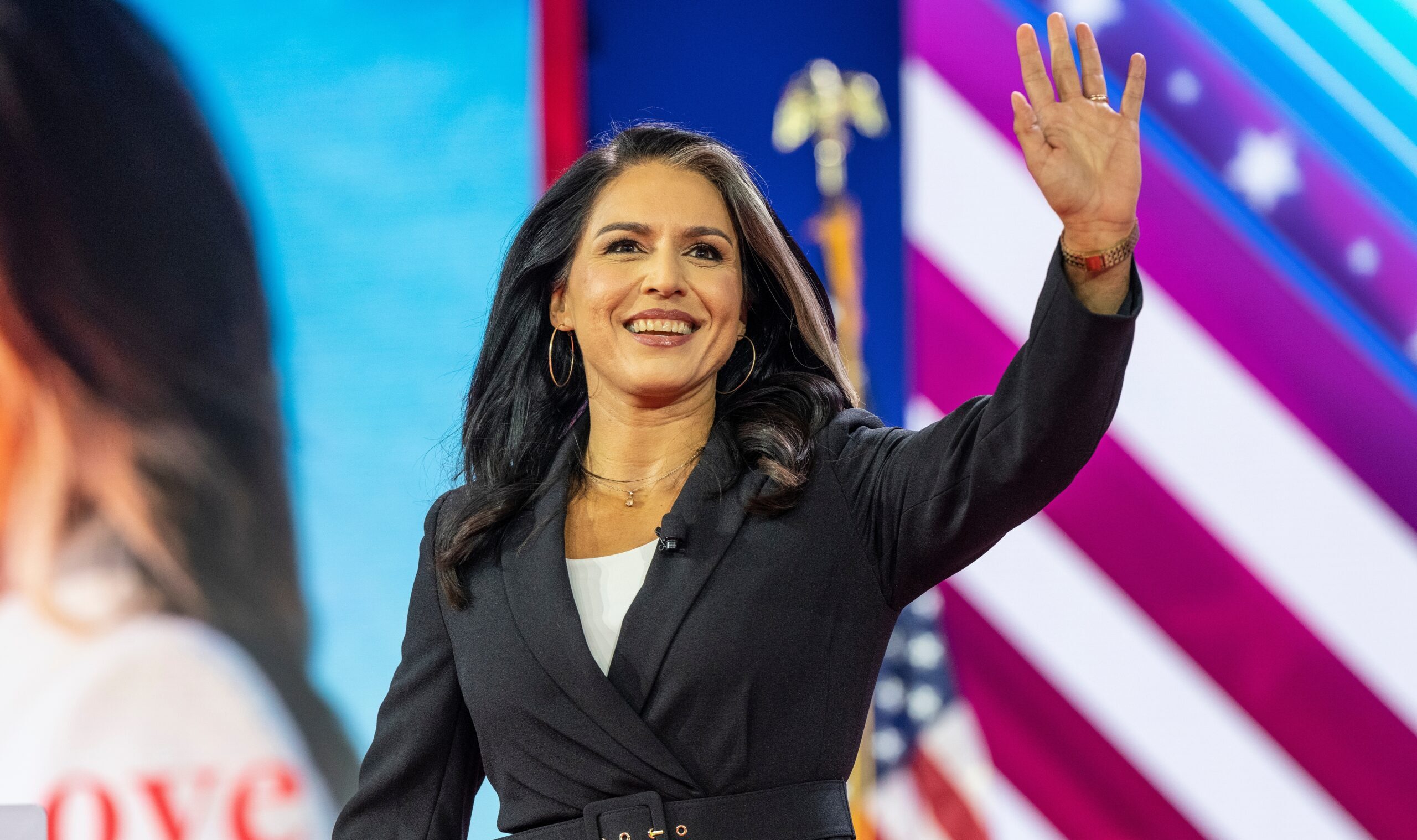Explore Tulsi Gabbard: DNI, Politics, & More
Could a former Democrat, a U.S. Representative, and a military officer truly be the best fit to lead the nation's intelligence apparatus? Tulsi Gabbard's appointment as Director of National Intelligence under the Trump administration sparked significant debate, highlighting a remarkable journey through politics and public service.
Born on April 12, 1981, in Leloaloa, American Samoa, Tulsi Gabbard's trajectory from a Pacific island to the highest echelons of American power is undeniably compelling. Raised in Hawaii from a young age, the influence of her parents, Mike and Carol Gabbard, laid the foundation for her future endeavors. Her father, Mike Gabbard, later became a Hawaii State Senator, providing further inspiration for her path.
| Attribute | Details |
|---|---|
| Full Name | Tulsi Gabbard |
| Date of Birth | April 12, 1981 |
| Place of Birth | Leloaloa, American Samoa |
| Education | Hawaii Pacific University (attended) |
| Political Party Affiliation | Democrat (formerly), Independent (currently) |
| Political Positions |
|
| Military Service | U.S. Army Reserve Officer |
| Religious Affiliation | Hindu |
| Notable Campaigns | 2020 Democratic Presidential Primary |
| Key Associations | Close association with India |
| Significant Events |
|
| Reference | Wikipedia |
Gabbard's political career began in Hawaii. Before entering the national stage, she served in the Hawaii State House of Representatives from 2002 to 2004, becoming the youngest person ever elected to that body. Her military service in the U.S. Army Reserve, including deployments to the Middle East, further shaped her perspectives and experiences.
- Emma Lahana Wiki Bio Age Career More Latest Updates
- Chris Brown Family Father Clinton Mother Joyce More
Her election to the U.S. House of Representatives in 2012 represented a significant milestone. Representing Hawaii's 2nd congressional district from 2013 to 2021, she navigated the complexities of Washington, D.C., addressing issues ranging from foreign policy to veterans' affairs. Her time in the House provided valuable experience, and she quickly became known for her independent stance on various issues. She was a prominent voice on foreign policy.
Gabbard's decision to seek the Democratic Party's presidential nomination in 2020 thrust her into the national spotlight. While her campaign did not lead to victory, it gave her a broader platform and highlighted her unique viewpoints. She advocated for non-interventionist foreign policies, a stance that often distinguished her from other candidates.
The appointment as Director of National Intelligence in 2025 was a turning point. This role places her at the center of the country's intelligence community. The Senate confirmation process wasn't without its challenges. Some lawmakers initially questioned her experience and judgment. Ultimately, she was confirmed, and she joined the Trump administration's inner circle.
As Director of National Intelligence, Gabbard was responsible for overseeing the nation's intelligence agencies and advising the president on critical matters of national security. This high-pressure role demanded both expertise and political acumen. However, her tenure in the role was also marked by controversy. She faced a federal charge after allegedly threatening to kill her. Furthermore, she initiated justice department referrals against individuals accused of leaking classified material to the press.
Gabbard's political journey has not been without its evolution. Following her departure from the House of Representatives, she left the Democratic Party and now identifies as an Independent. This move reflects her evolving political views and the complex political landscape in which she operates.
Gabbard's approach to foreign policy has always been a defining characteristic. Her focus on non-interventionism and diplomatic solutions has placed her at odds with some in the mainstream. She has consistently called for a more cautious and less aggressive foreign policy approach, emphasizing the importance of diplomacy over military intervention. Her views on foreign policy are extensive.
In the wake of her confirmation, Gabbard met with Indian Prime Minister Narendra Modi, underscoring her interest in international relations. Her close associations with India are not a result of her heritage; she holds a close association with the country, and is also of the Hindu faith.
The story of Tulsi Gabbard is a complex one, filled with moments of triumph and controversy. From her upbringing in American Samoa and Hawaii to her service in the military, her time in Congress, her presidential run, and her role as Director of National Intelligence, she has consistently defied easy categorization. Her shift to the Republican party demonstrates a willingness to challenge conventional thinking.
The Senate's confirmation of her as Director of National Intelligence added the former Democrat to President Trump's inner circle. This appointment, following a career marked by resilience and determination, signaled a new chapter in her public service.
The debate surrounding her suitability for the role reflects the complexities of American politics and the challenges of navigating a polarized political environment. As an Independent, she continues to be a prominent public figure and a subject of intense interest for political analysts and the public. Her experiences from the Hawaiian islands to the halls of power have been nothing short of inspirational.
Gabbard's career represents a study in contrasts. She is a politician, a military officer, and a public figure. Her commitment to public service has been a constant thread throughout her journey. From her early life in American Samoa to her time as a congresswoman, and her role as DNI, Tulsi Gabbard's story offers a glimpse into the evolution of a political figure. She continues to spark debates and shape the American political discourse.
The appointment of Tulsi Gabbard as Director of National Intelligence in 2025 has set the stage for a new phase in her career. It will be interesting to see how her policies and actions will affect the intelligence and national security. As she continues her work in public service, she will be watched and scrutinized by both supporters and detractors.
Her path from a small island to the corridors of power is an embodiment of resilience and an unwavering commitment to public service. Her influence on national security will undoubtedly be observed. Tulsi Gabbard will continue to make waves in the world of American politics.
Article Recommendations
- Love Is Blinds Leo Brittany Secrets After The Pods Revealed
- Small Hands Facts Advantages More Unveiling The Details



Detail Author:
- Name : Mr. Jaden Bogan
- Username : deion.rogahn
- Email : chloe72@gmail.com
- Birthdate : 1975-03-02
- Address : 2215 Reynolds Key Apt. 915 Port Veronica, PA 35386-4155
- Phone : +1-667-777-1723
- Company : Jacobs, Hoeger and Denesik
- Job : Stock Broker
- Bio : Praesentium et quia aliquid quos officiis. Repudiandae quisquam iusto laudantium. Autem quaerat velit velit fugit aliquid. Praesentium autem rem optio non et velit.
Socials
instagram:
- url : https://instagram.com/lela_real
- username : lela_real
- bio : Officia molestiae itaque magnam. Sunt delectus officiis ut voluptatem porro provident ea nemo.
- followers : 4336
- following : 56
twitter:
- url : https://twitter.com/quitzonl
- username : quitzonl
- bio : Rerum numquam sint aut optio eveniet. Laborum aut est dolorem atque sint cumque. Id voluptatum rem pariatur in doloribus possimus.
- followers : 6834
- following : 2038